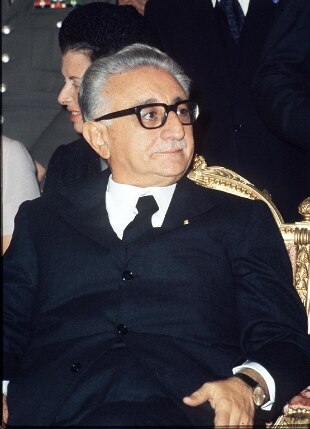Giovanni Leone (Ansa)
Share
November 11, 2021 Distinguished jurist, long considered one of the most illustrious criminal lawyers in Italy.
Military in the Second World War, he earned a solemn commendation from the Ministry
of Defense.
Then, among the founders of the Neapolitan Christian Democracy and deputy for twenty years;
then president of the Chamber, prime minister, senator for life and, from 24 December 1971 to 15 June 1978 head of state.
That of Giovanni Leone, who died on November 9, 2001 at the age of 93, was the life of a 'father' of the Republic.
Born in Naples on November 3, 1908, he graduated in law in 1929 at the University of his city and in political science in 1930. He immediately devoted himself to the legal profession and at the same time began his university career. A free lecturer in law and criminal procedure, in 1933 he was entrusted with teaching this subject at the University of Camerino. In 1935, ranking first in the ranking of the competition for the chair of criminal law and procedure, he began teaching at the University of Messina, later moving to Bari, Naples and then to Rome. Leone was the author of numerous legal publications, also translated abroad. His fundamental work is the '' Treaty of Criminal Procedure '',reprinted continuously for 40 years and adopted in numerous Italian and foreign universities.
Son of one of the founders of Don Luigi Sturzo's Popular Party in Naples, Leone in 1944 was himself one of the founders of the Christian Democrats of the Campania capital and the following year he was elected political secretary of the party's city committee. His national political career began in 1946, when he was elected to the Constituent Assembly: he actively participated in the drafting of the Constitutional Charter, as a member of the Commission of 75, in particular drafting the title concerning the judiciary.
Leone was re-elected member of Parliament in 1948. From 1950 to '53 he was vice president of the Chamber. On 10 May 1955 he took the place of Giovanni Gronchi, elected President of the Republic, in the office of Speaker of the Chamber. He was re-elected to this office twice, in 1958 and 1963. On June 19, 1963, he was appointed prime minister, forming a single-party Christian Democratic government which remained in office until November 5 of the same year. He was again appointed Prime Minister on June 24, 1968, remaining in Palazzo Chigi until the following December 11. In the meantime, on 27 August 1967, by the will of the then President of the Republic Giuseppe Saragat, he had been appointed senator for life for having illustrated the homeland '' for very high merits in the scientific and social field ''.
Out of the games of the internal currents of the DC, the name of Leone was chosen in moments of difficulty by the center-left majority to launch the so-called `` seaside governments '' which, according to Aldo Moro, had to represent brackets to try to overcome crossed vetoes among the Christian Democratic currents or in the relationship with the PSI.
Parallel to his political activity, he continued his university career as full professor of procedural law, which he held until December 24, 1971, when he was elected president of the Republic.
The seven-year period of Leone at the Quirinale was one of the most dramatic in Italian history.
The offensive against Leone was launched in 1976 with the revelations about Lockheed, an international scandal related to the corruption work carried out in many countries by the US manufacturer of warplanes.
He was forced to resign as President of the Republic on June 15, 1978, following bitter controversies and accusations, which later turned out to be unfounded.
He said goodbye to the Quirinale with a message to the nation.

